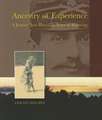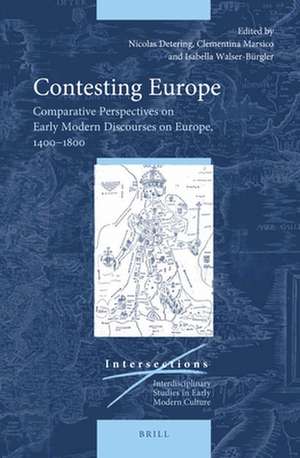Contesting Europe: Comparative Perspectives on Early Modern Discourses on Europe, 1400–1800: Intersections, cartea 67
Nicolas Detering, Clementina Marsico, Isabella Walser-Bürgleren Limba Engleză Hardback – 18 dec 2019
Contributors are: Ovanes Akopyan, Volker Bauer, Piotr Chmiel, Nicolas Detering, Stefan Ehrenpreis, Niels Grüne, Peter Hanenberg, Ulrich Heinen, Ronny Kaiser, Niall Oddy, Katharina N. Piechocki, Dennis Pulina, Marion Romberg, Lucie Storchová, Isabella Walser-Bürgler, Michael Wintle, and Enrico Zucchi.
Din seria Intersections
-
 Preț: 215.61 lei
Preț: 215.61 lei -
 Preț: 200.26 lei
Preț: 200.26 lei -
 Preț: 154.86 lei
Preț: 154.86 lei -
 Preț: 192.18 lei
Preț: 192.18 lei -
 Preț: 98.61 lei
Preț: 98.61 lei -
 Preț: 217.51 lei
Preț: 217.51 lei -
 Preț: 116.09 lei
Preț: 116.09 lei - 18%
 Preț: 1074.49 lei
Preț: 1074.49 lei -
 Preț: 241.64 lei
Preț: 241.64 lei -
 Preț: 241.64 lei
Preț: 241.64 lei -
 Preț: 228.96 lei
Preț: 228.96 lei -
 Preț: 229.55 lei
Preț: 229.55 lei -
 Preț: 241.64 lei
Preț: 241.64 lei -
 Preț: 226.67 lei
Preț: 226.67 lei -
 Preț: 107.21 lei
Preț: 107.21 lei -
 Preț: 208.79 lei
Preț: 208.79 lei -
 Preț: 201.78 lei
Preț: 201.78 lei -
 Preț: 226.85 lei
Preț: 226.85 lei -
 Preț: 225.71 lei
Preț: 225.71 lei -
 Preț: 246.63 lei
Preț: 246.63 lei -
 Preț: 228.96 lei
Preț: 228.96 lei - 47%
 Preț: 319.92 lei
Preț: 319.92 lei - 7%
 Preț: 315.66 lei
Preț: 315.66 lei -
 Preț: 96.10 lei
Preț: 96.10 lei - 18%
 Preț: 1201.75 lei
Preț: 1201.75 lei - 18%
 Preț: 659.69 lei
Preț: 659.69 lei - 18%
 Preț: 693.26 lei
Preț: 693.26 lei - 18%
 Preț: 1049.43 lei
Preț: 1049.43 lei - 18%
 Preț: 698.32 lei
Preț: 698.32 lei - 18%
 Preț: 681.99 lei
Preț: 681.99 lei - 18%
 Preț: 687.25 lei
Preț: 687.25 lei - 18%
 Preț: 820.59 lei
Preț: 820.59 lei - 18%
 Preț: 683.37 lei
Preț: 683.37 lei - 18%
 Preț: 667.86 lei
Preț: 667.86 lei
Preț: 637.46 lei
Preț vechi: 777.38 lei
-18% Nou
Puncte Express: 956
Preț estimativ în valută:
121.98€ • 127.94$ • 101.54£
121.98€ • 127.94$ • 101.54£
Carte indisponibilă temporar
Doresc să fiu notificat când acest titlu va fi disponibil:
Se trimite...
Preluare comenzi: 021 569.72.76
Specificații
ISBN-13: 9789004376052
ISBN-10: 9004376054
Dimensiuni: 155 x 235 mm
Greutate: 0.89 kg
Editura: Brill
Colecția Brill
Seria Intersections
ISBN-10: 9004376054
Dimensiuni: 155 x 235 mm
Greutate: 0.89 kg
Editura: Brill
Colecția Brill
Seria Intersections
Cuprins
List of Illustrations
Notes on the Editors
Notes on the Contributors
Contesting Europe: Comparative Perspectives on Early Modern Discourses on Europe (1400–1800) — an Introduction
Nicolas Detering, Clementina Marsico and Isabella Walser-Bürgler
1 Rivalry of Lament: Early Personifications of Europe in Neo-Latin Panegyrics for Charles V and Francis I
Nicolas Detering and Dennis Pulina
2 Tota caduca et dehiscens — Europe’s Critical Condition in Andrés Laguna’s Europa (1543)
Ronny Kaiser
3 The Early Modern Iconography of Europe: Visual Images and European Identity
Michael Wintle
4 Did Europe Exist in the Parish before 1800? The Allegory of Europe and Her Three Siblings in Folk Culture
Marion Romberg
5 Rubens’ Europe and the Pax Hispanica
Ulrich Heinen
6 Cartographic Manipulations: Framing the Centre of Europe in ca. 1500
Katharina N. Piechocki
7 Conflicts of Meaning: the Word Europe in Sixteenth-Century French Writing
Niall Oddy
8 Portugal and the Early Modern Discourse on Europe
Peter Hanenberg
9 How Did Venetian Diplomatic Envoys Define Europe, Its Divisions, Centres and Peripheries (ca. 1570–1645)?
Piotr Chmiel
10 Conceptualising Asia, Africa and Europa in a Polemic on the Origin of Bohemians (1615–1617): Supranational Geographical Units and a Humanist Competition for ‘National Honour’
Lucie Storchová
11 Europe or Not? Early Sixteenth-Century European Descriptions of Muscovy and the Russian Responses
Ovanes Akopyan
12 Liberty and Participation: Governance Ideals in the Self-Fashioning of Sixteenth- to Early-Eighteenth-Century Europe
Niels Grüne and Stefan Ehrenpreis
13 Geopolitical Instruction and the Construction of Europe in Seventeenth-Century Neo-Latin Texts
Isabella Walser-Bürgler
14 The European Network and National Identity: Italian Journalism in the Early Eighteenth Century from Il Giornale de’ letterati d’Italia to Il Gran giornale d’Europa
Enrico Zucchi
15 Europe as a Political System, an Ideal and a Selling Point: the Renger Series (1704–1718)
Volker Bauer
Index Nominum
Notes on the Editors
Notes on the Contributors
Contesting Europe: Comparative Perspectives on Early Modern Discourses on Europe (1400–1800) — an Introduction
Nicolas Detering, Clementina Marsico and Isabella Walser-Bürgler
Part 1: Embodying Europe: Allegories of the Self and the Other
1 Rivalry of Lament: Early Personifications of Europe in Neo-Latin Panegyrics for Charles V and Francis I
Nicolas Detering and Dennis Pulina
2 Tota caduca et dehiscens — Europe’s Critical Condition in Andrés Laguna’s Europa (1543)
Ronny Kaiser
3 The Early Modern Iconography of Europe: Visual Images and European Identity
Michael Wintle
4 Did Europe Exist in the Parish before 1800? The Allegory of Europe and Her Three Siblings in Folk Culture
Marion Romberg
5 Rubens’ Europe and the Pax Hispanica
Ulrich Heinen
Part 2: Centralising Europe: Constructions of Peripheries and Boundaries
6 Cartographic Manipulations: Framing the Centre of Europe in ca. 1500
Katharina N. Piechocki
7 Conflicts of Meaning: the Word Europe in Sixteenth-Century French Writing
Niall Oddy
8 Portugal and the Early Modern Discourse on Europe
Peter Hanenberg
9 How Did Venetian Diplomatic Envoys Define Europe, Its Divisions, Centres and Peripheries (ca. 1570–1645)?
Piotr Chmiel
10 Conceptualising Asia, Africa and Europa in a Polemic on the Origin of Bohemians (1615–1617): Supranational Geographical Units and a Humanist Competition for ‘National Honour’
Lucie Storchová
11 Europe or Not? Early Sixteenth-Century European Descriptions of Muscovy and the Russian Responses
Ovanes Akopyan
Part 3: Balancing Europe: Discourses of Plurality and Power
12 Liberty and Participation: Governance Ideals in the Self-Fashioning of Sixteenth- to Early-Eighteenth-Century Europe
Niels Grüne and Stefan Ehrenpreis
13 Geopolitical Instruction and the Construction of Europe in Seventeenth-Century Neo-Latin Texts
Isabella Walser-Bürgler
14 The European Network and National Identity: Italian Journalism in the Early Eighteenth Century from Il Giornale de’ letterati d’Italia to Il Gran giornale d’Europa
Enrico Zucchi
15 Europe as a Political System, an Ideal and a Selling Point: the Renger Series (1704–1718)
Volker Bauer
Index Nominum
Notă biografică
Nicolas Detering, Ass.-Prof. Dr. (* 1985), is assistant professor of German Literature at the University of Bern. He specialises in early modern literature and has published on German poetry and ideas of Europe in the seventeenth century.
Clementina Marsico, Dr. (* 1983), Ludwig Boltzmann Institute for Neo-Latin Studies, Innsbruck, is a researcher of Italian Humanism. She has published monographs, editions and commentaries, collected volumes and many articles on Renaissance Italy in general and Lorenzo Valla in particular.
Isabella Walser-Bürgler, Dr. (* 1988), Ludwig Boltzmann Institute for Neo-Latin Studies, Innsbruck, is key researcher at that institute. She has published various editions and articles on the Neo-Latin novel, the concept of Europe in Neo-Latin literature, and university orations.
Clementina Marsico, Dr. (* 1983), Ludwig Boltzmann Institute for Neo-Latin Studies, Innsbruck, is a researcher of Italian Humanism. She has published monographs, editions and commentaries, collected volumes and many articles on Renaissance Italy in general and Lorenzo Valla in particular.
Isabella Walser-Bürgler, Dr. (* 1988), Ludwig Boltzmann Institute for Neo-Latin Studies, Innsbruck, is key researcher at that institute. She has published various editions and articles on the Neo-Latin novel, the concept of Europe in Neo-Latin literature, and university orations.
Recenzii
"Compared to previous research on the discursive construction of “Europe”, the volume differs in three respects: Firstly, it takes into account little-noticed spatial peripheries and their sources in the various national languages and in Neo-Latin. This multi-perspectivity positively sets the volume apart from many other English-language compilations. Second, the contributions expand the range of sources to include a multitude of visual media and text genres. Third, with the 250 years from the late 15th to the early 18th century, it deals with the "pre-Enlightenment" part of the early modern period, which is often left out." (translated from German)
Joachim Berger, Leibniz Institute of European History, in H-Soz-Kult, 15.12.2020
"Gegenüber bisherigen Forschungen zur diskursiven Konstruktion „Europas“ unterscheidet sich der Band in dreifacher Hinsicht: Er berücksichtigt erstens wenig beachtete räumliche Peripherien und ihre Quellen in den verschiedenen Landessprachen und im Neulateinischen. Diese Multiperspektivität erstreckt sich zudem auf die (auch osteuropäische) Forschungsliteratur, die rezipiert wird; das hebt den Band positiv von manch anderem englischsprachigen Sammelwerk ab. Zweitens besteigen die Beiträge nicht nur die Höhenkämme des Schrifttums und der bildenden Künste, sondern erweitern das Quellenspektrum um eine Vielzahl visueller Medien und Textgattungen. Drittens behandelt er mit den gut 250 Jahren vom späten 15. zum frühen 18. Jahrhundert den „voraufklärerischen“ Teil der Frühneuzeit, der aufgrund von Peter Burkes wirkmächtigem Zweifel, ob es vor 1700 ein auf Europa bezogenes "collective consciousness" gegeben habe, häufig ausgespart wurde."
Joachim Berger, Leibniz Institute of European History, in H-Soz-Kult, 15.12.2020
Joachim Berger, Leibniz Institute of European History, in H-Soz-Kult, 15.12.2020
"Gegenüber bisherigen Forschungen zur diskursiven Konstruktion „Europas“ unterscheidet sich der Band in dreifacher Hinsicht: Er berücksichtigt erstens wenig beachtete räumliche Peripherien und ihre Quellen in den verschiedenen Landessprachen und im Neulateinischen. Diese Multiperspektivität erstreckt sich zudem auf die (auch osteuropäische) Forschungsliteratur, die rezipiert wird; das hebt den Band positiv von manch anderem englischsprachigen Sammelwerk ab. Zweitens besteigen die Beiträge nicht nur die Höhenkämme des Schrifttums und der bildenden Künste, sondern erweitern das Quellenspektrum um eine Vielzahl visueller Medien und Textgattungen. Drittens behandelt er mit den gut 250 Jahren vom späten 15. zum frühen 18. Jahrhundert den „voraufklärerischen“ Teil der Frühneuzeit, der aufgrund von Peter Burkes wirkmächtigem Zweifel, ob es vor 1700 ein auf Europa bezogenes "collective consciousness" gegeben habe, häufig ausgespart wurde."
Joachim Berger, Leibniz Institute of European History, in H-Soz-Kult, 15.12.2020
